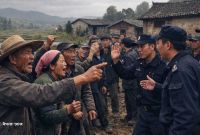China's forced urbanization of rural Tibetans accelerates, reports Human Rights Watch

Human Rights Watch (HRW) recently released a detailed report indicating that China is accelerating the forced urbanization of Tibetan villagers and herders. This report adds to existing state government and independent observations that highlight efforts to assimilate rural Tibetans by controlling their language and traditional Buddhist culture. The international rights organization found internal Chinese reports that contradict official statements claiming that all relocated Tibetans moved voluntarily, despite the destruction of their previous homes upon departure.
The forced relocations reflect a broader pattern of coercive demands for ethnic minorities to adopt Mandarin as their primary language and pledge allegiance to the ruling Communist Party. This pattern is seen in China's western and northern territories, which are home to millions of Tibetans, Xinjiang Uyghurs, Mongolians, and other minority groups. Although China asserts that Tibet has been part of its territory for centuries, firm control over the region was only established after the Communist Party's rise to power in the 1949 civil war.
According to HRW, higher-level authorities place significant pressure on local officials, portraying the relocation program as a politically critical, non-negotiable policy originating from Beijing or Lhasa. This leaves local officials with no flexibility in implementation and requires them to secure 100 percent agreement from affected villagers for relocation.
Official statistics suggest that by the end of 2025, more than 930,000 rural Tibetans will have been relocated to urban centers. In these urban areas, they lose their traditional sources of income and struggle to find employment. Lhasa and other large towns have experienced an influx of migrants from China’s dominant Han ethnic group, who dominate politics and the economy. Over 3 million of the more than 4.5 million Tibetans in rural areas have been forced to abandon their nomadic lifestyles, which were based on yak herding and agriculture. In addition to the Tibetan Autonomous Region, Tibetan communities are present in the neighbouring provinces of Sichuan, Yunnan, and Qinghai.
HRW's report highlights that these relocations are detrimental to Tibetan culture and ways of life. Most relocation programs in Tibet move former farmers and pastoralists to areas where they cannot continue their traditional livelihoods, forcing them to seek work as wage labourers in non-agricultural industries.
China defends its policies in Tibet, claiming they bring stability and development to a strategically important border region. The last significant anti-government protests in Tibet occurred in 2008, resulting in a massive military crackdown. Foreigners require special permission to visit, and journalists are generally barred, except for those working for Chinese state media outlets. China consistently dismisses allegations of human rights abuses in Tibetan regions as baseless accusations intended to smear the country’s image.
In August, Foreign Ministry spokesperson Wang Wenbin stated that human rights conditions in Tibet were “at their historical best.” Wang asserted that the region enjoys a booming economy, harmonious society, and effective protection and promotion of cultural heritage. He emphasized that the rights and freedoms of all ethnic groups, including religious freedom and the freedom to use and develop their languages, are fully guaranteed.
China, with a population of 1.4 billion, claims to have eradicated extreme poverty by relocating isolated homes and small villages into larger communities with better access to transport, electricity, healthcare, and education. However, these claims have not been independently verified.
China’s economic growth has slowed considerably due to an aging population and a rising youth unemployment rate. Despite this, Chinese industries like electric vehicles and mobile phones continue to expand their market shares overseas. The forced urbanization and relocation policies are part of broader government efforts to address these economic challenges and integrate ethnic minorities into the mainstream economy.
HRW has called on the United Nations Human Rights Council to conduct an independent investigation into human rights violations committed by the Chinese government in Tibet and other regions. This call underscores the international concern over China’s treatment of ethnic minorities and the impact of its policies on traditional cultures and ways of life.
The forced urbanization of rural Tibetans is part of a larger strategy by the Chinese government to assert control over its western and northern territories. This strategy includes not only relocation but also efforts to assimilate ethnic minorities through education and language policies. Mandarin is promoted as the primary language of instruction in schools, and traditional Tibetan cultural practices are being suppressed.
These policies have led to widespread resentment among Tibetan communities, who feel that their way of life and cultural heritage are being systematically eroded. The relocation programs often result in social and economic dislocation, as Tibetans struggle to adapt to urban life and find employment.
In conclusion, China’s accelerated forced urbanization of rural Tibetans, as reported by Human Rights Watch, raises significant human rights concerns. The relocation policies disrupt traditional lifestyles and erode cultural practices, forming part of a broader effort to integrate ethnic minorities into the Chinese mainstream. As the international community continues to scrutinize China’s policies, independent verification and investigation into human rights practices in Tibet remain critical. The Chinese government’s approach to managing its diverse population will likely continue to be a contentious issue in the coming years.




![From Kathmandu to the World: How Excel Students Are Winning Big [Admission Open]](https://nepalaaja.com/img/70194/medium/excel-college-info-eng-nep-2342.jpg)
